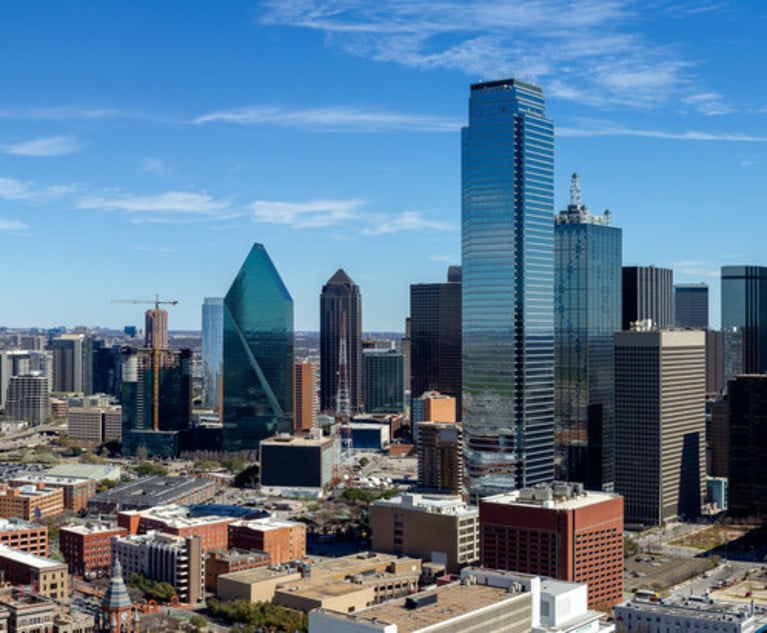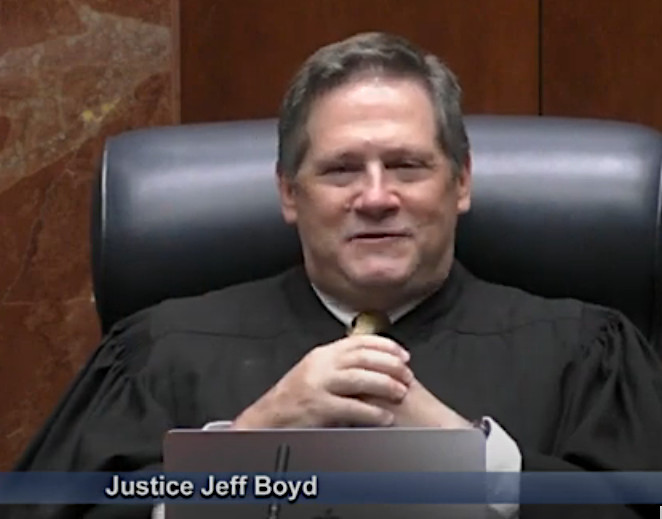 William Brewer III of Brewer, Attorneys & Counselors
William Brewer III of Brewer, Attorneys & CounselorsDallas Attorney Kicked Off NRA Case for Failure to Disclose $177K Sanction
A Virginia federal judge has prevented prominent Dallas attorney William Brewer III from representing the NRA in a contract dispute with an insurance company after the lawyer failed to disclose to the court that he was sanctioned for ethical violations in Texas.
September 13, 2018 at 05:02 PM
4 minute read
A Virginia federal judge has prevented prominent Dallas attorney William Brewer III from representing the NRA in a contract dispute with an insurance company after the lawyer failed to disclose to the court that he was sanctioned for ethical violations in Texas.
Brewer, who is not licensed in Virginia, filed a pro hac vice application on June 19 in National Rifle Association v. Lockton seeking approval to make an appearance. In it, Brewer promised that he had “not been reprimanded in any court nor has there been any action in any court pertaining to my conduct or fitness as a member of the bar.”
However, Brewer was hit with a $177,000 sanction in 2016 by 72nd District Court Judge Ruben Reyes of Lubbock, who found the lawyer engaged in an abusive litigation tactic when he commissioned a so-called “push poll” over issues in a case in which Brewer was defending Titeflex, a company accused of manufacturing faulty flexible gas tubing that allegedly caused a deadly house fire.
The practice of conducting a poll aimed at shaping, rather than measuring, opinion is colloquially called “push-polling.”
Brewer has denied that he commissioned the push poll and has long maintained that he did nothing wrong. He argued on appeal that his “jury focus exercise” was ethical because no state law, rule or court decision prevents lawyers from commissioning jury surveys. But Amarillo's Seventh Court of Appeals shot down Brewer's argument last March 26, affirming the $177,000 sanction award against him in Brewer v. Lennox Hearth Products. Brewer has since appealed that decision to the Texas Supreme Court.
After learning of the Texas ruling, U.S. District Judge Liam O'Grady of the Eastern District of Virginia called Brewer before the court on Sept. 13 to inquire into the accuracy of his pro hac vice certification in the NRA case.
“These are very serious allegations,” O'Grady said during the hearing, according to a report in The Washington Post. “They're findings of bad faith.”
Brewer told O'Grady that he did not consider the sanction judgment final because he's appealed it to the Texas Supreme Court, according to the report. But O'Grady did not accept Brewer's explanation and declined the lawyer's request to appear in his court.
“We are disappointed in the decision, but our law firm will continue to represent the NRA in these proceedings,” said Michael J. Collins, a partner at Brewer, Attorneys & Counselors. “This decision has no bearing on the NRA's claims against Lockton, nor does it impact Mr. Brewer's involvement in any other proceedings on behalf of the NRA.”
Andrew Arulanandam, a spokesman for the NRA, said the organization fully supports Brewer Attorneys & Counselors. “Today's decision has no bearing on our relationship with Mr. Brewer and his firm – or the advocacy being undertaken to protect the legal and regulatory interests of our organization,” Arulanandam said. “This decision also has no bearing on the NRA's claims against Lockton or our ongoing efforts to hold the company responsible for its alleged breach of fiduciary duty. The NRA will continue to work with the Brewer firm to aggressively pursue the remedies to which the NRA is entitled.
Ted Lyon, a Dallas lawyer who represents the plaintiffs and who originally pursued sanctions against Brewer, believes O'Grady's ruling is significant.
“He should have told him about the sanction he got in Lennox,” Lyon said, noting that his law firm sent a letter to the Texas Supreme Court advising them to take judicial notice of Brewer's hearing in the Virginia case.
“We think what Judge Reyes did was the right thing to do and anyone who tampers with a jury pool should be punished,” Lyon said. “A lawyer shouldn't practice law that way.”
This content has been archived. It is available through our partners, LexisNexis® and Bloomberg Law.
To view this content, please continue to their sites.
Not a Lexis Subscriber?
Subscribe Now
Not a Bloomberg Law Subscriber?
Subscribe Now
NOT FOR REPRINT
© 2025 ALM Global, LLC, All Rights Reserved. Request academic re-use from www.copyright.com. All other uses, submit a request to [email protected]. For more information visit Asset & Logo Licensing.
You Might Like
View All

Patent Disputes Over SharkNinja, Dyson Products Nearing Resolution

Texas Attorneys Put Civil Rights Nonprofits on Notice About Defaming Right-Wing Conservatives
3 minute read
Paxton Boasts as Texas Supreme Court Splits on Disciplining First Assistant Attorney General
4 minute readTrending Stories
- 1The Fearless Forecaster’s Employment Law Predictions for 2025
- 2Judicial Conference Declines Democratic Request to Refer Justice Thomas to DOJ
- 3People in the News—Jan. 2, 2025—Eastburn and Gray, Klehr Harrison
- 4Deal Watch: Latham, Paul Weiss, Debevoise Land on Year-End Big Deals. Plus, Mixed Messages for 2025 M&A
- 5Bathroom Recording Leads to Lawyer's Disbarment: Disciplinary Roundup
Who Got The Work
Michael G. Bongiorno, Andrew Scott Dulberg and Elizabeth E. Driscoll from Wilmer Cutler Pickering Hale and Dorr have stepped in to represent Symbotic Inc., an A.I.-enabled technology platform that focuses on increasing supply chain efficiency, and other defendants in a pending shareholder derivative lawsuit. The case, filed Oct. 2 in Massachusetts District Court by the Brown Law Firm on behalf of Stephen Austen, accuses certain officers and directors of misleading investors in regard to Symbotic's potential for margin growth by failing to disclose that the company was not equipped to timely deploy its systems or manage expenses through project delays. The case, assigned to U.S. District Judge Nathaniel M. Gorton, is 1:24-cv-12522, Austen v. Cohen et al.
Who Got The Work
Edmund Polubinski and Marie Killmond of Davis Polk & Wardwell have entered appearances for data platform software development company MongoDB and other defendants in a pending shareholder derivative lawsuit. The action, filed Oct. 7 in New York Southern District Court by the Brown Law Firm, accuses the company's directors and/or officers of falsely expressing confidence in the company’s restructuring of its sales incentive plan and downplaying the severity of decreases in its upfront commitments. The case is 1:24-cv-07594, Roy v. Ittycheria et al.
Who Got The Work
Amy O. Bruchs and Kurt F. Ellison of Michael Best & Friedrich have entered appearances for Epic Systems Corp. in a pending employment discrimination lawsuit. The suit was filed Sept. 7 in Wisconsin Western District Court by Levine Eisberner LLC and Siri & Glimstad on behalf of a project manager who claims that he was wrongfully terminated after applying for a religious exemption to the defendant's COVID-19 vaccine mandate. The case, assigned to U.S. Magistrate Judge Anita Marie Boor, is 3:24-cv-00630, Secker, Nathan v. Epic Systems Corporation.
Who Got The Work
David X. Sullivan, Thomas J. Finn and Gregory A. Hall from McCarter & English have entered appearances for Sunrun Installation Services in a pending civil rights lawsuit. The complaint was filed Sept. 4 in Connecticut District Court by attorney Robert M. Berke on behalf of former employee George Edward Steins, who was arrested and charged with employing an unregistered home improvement salesperson. The complaint alleges that had Sunrun informed the Connecticut Department of Consumer Protection that the plaintiff's employment had ended in 2017 and that he no longer held Sunrun's home improvement contractor license, he would not have been hit with charges, which were dismissed in May 2024. The case, assigned to U.S. District Judge Jeffrey A. Meyer, is 3:24-cv-01423, Steins v. Sunrun, Inc. et al.
Who Got The Work
Greenberg Traurig shareholder Joshua L. Raskin has entered an appearance for boohoo.com UK Ltd. in a pending patent infringement lawsuit. The suit, filed Sept. 3 in Texas Eastern District Court by Rozier Hardt McDonough on behalf of Alto Dynamics, asserts five patents related to an online shopping platform. The case, assigned to U.S. District Judge Rodney Gilstrap, is 2:24-cv-00719, Alto Dynamics, LLC v. boohoo.com UK Limited.
Featured Firms
Law Offices of Gary Martin Hays & Associates, P.C.
(470) 294-1674
Law Offices of Mark E. Salomone
(857) 444-6468
Smith & Hassler
(713) 739-1250






